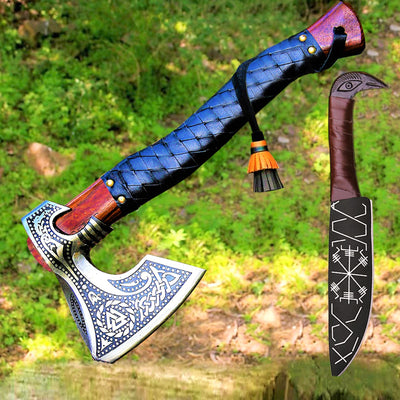How to Make a Handmade Viking Axe | A Step-by-Step Guide
- by Asad Musla
Table of Contents
Introduction
Organizing the Hatchet
The Hatchet Head's Production
Putting the Hatchet Handle Together
Picking Up the Hatchet
Final details
Conclusion
1. Introduction
How to Make a Handmade Viking Axe is a renowned Viking Age weapon and tool, renowned for its craftsmanship and common sense. Crafting a high-quality Viking hatchet can be a rewarding experience that connects you with ancient traditions and provides an amazing artifact to display or use. This guide will take you step-by-step through the process of creating a hand-tailored Viking hatchet, from selecting materials to adding the final contacts.
2. Materials Needed
Before you start, gather all the necessary supplies. Below is a summary of what you will need:
The hatchet head is made of high-carbon steel.
Hardwood for the handle, such as hardwood or ash
Sledge and iron block
Propane light or fashion
Cutlery
Processor or documents
Wood stick or epoxy
Sandpaper
Finish or color of the wood
Protective gear, such as gloves, safety glasses, and a cover
3. Organizing the Hatchet
Start by providing an example of your approach. Traditional Viking tomahawks typically feature a long handle and a broad, curved, sharp edge, though they can vary in size and shape. Considering feel and practicality, pick the features and design that best suit your requirements.
4. Heating the Steel to Produce the Hatchet Head: The high-carbon steel should first be heated in the manner until it reaches a brilliant orange hue.
Shape the Edge: Using the sledge, precisely define the ebb and flow and edge of the warmed steel to create the desired cutting edge shape.
Structure the Eye: Either punch through the steel or fold the steel over a mandrel to create the opening (eye) where the handle will fit.
Refine the Shape: To ensure a sharp edge and well-balanced structure, sledge the steel and apply constant intensity until you reach the final shape.
Extinguish and Treat: To harden the steel, intensify the hatchet head one last time and extinguish it in water or oil. Then, to reduce fragility, temper it by gradually chilling it after heating it to a lower temperature.
5. Creating the Handle for the Hatchet
Choose the Wood: Choose hardwoods that are strong, such as hickory or debris.
Shape the Handle: To create the handle configuration, cut and shape the wood, making it longer and slightly bent for balance and grip.
Fit the Handle: Make sure the handle's highest point slides comfortably into the hatchet head's eye. To achieve the perfect fit, you may need to trim or sand it.
Finish the Handle: For safety and aesthetics, sand the handle smoothly or apply wood color or finish.
6. Picking Up the Hatchet
Join the Head: Make sure the hatchet head fits securely and firmly by sliding it onto the handle.
To secure the head, use wood paste or epoxy to reinforce the association. To lengthen the handle inside the eye, some traditional methods involve wedging a small piece of metal or wood into the handle's highest point.
Final Changes: Pay close attention to how the hatchet is arranged and balanced. To ensure it feels comfortable and stable in your hands, make any necessary adjustments.
7. Concluding information
Sharpen the Edge: To achieve a fine edge suitable for cutting and cleaving, use a processor or record to sharpen the cutting edge.
Clean the Metal: To give the hatchet head a flawless, finished appearance, clean it of any rough places.
Protect the Wood: To prevent cracking and wear, apply a protective coating to the handle, such as linseed oil or a particular wood finish.
8. Conclusion
How to make a Viking axe combines artistry, history, and useful information in a fruitful undertaking. By following these instructions, you will be able to create a fun and practical instrument and gain a better knowledge of Viking Age artisans. Whether you intend to show your hatchet, use it for reenactments, or just be involved in the process of making it, this guide guarantees that you will have an impressive and genuine piece of Viking heritage.
- Posted in:
- How to make a Viking axe






